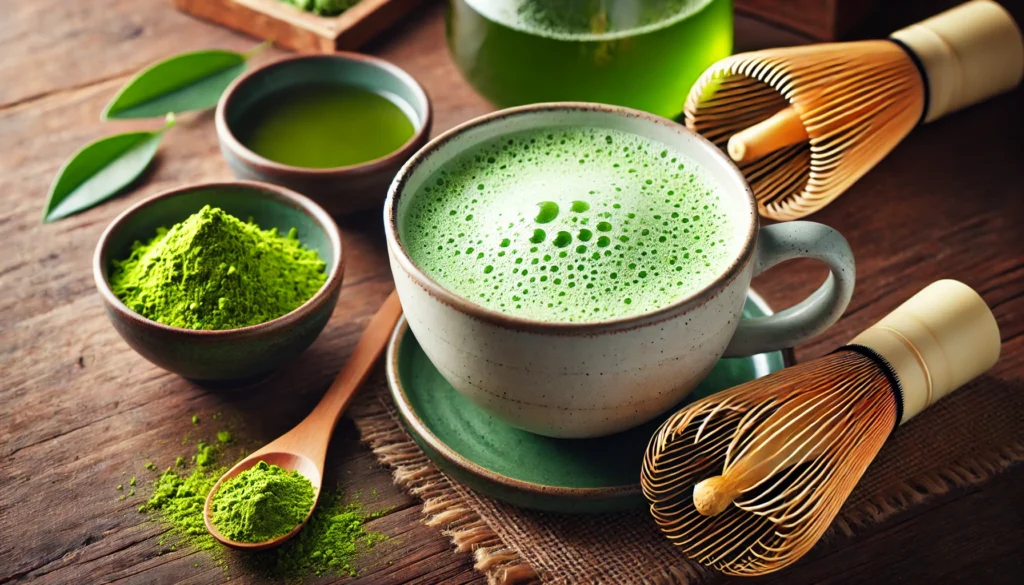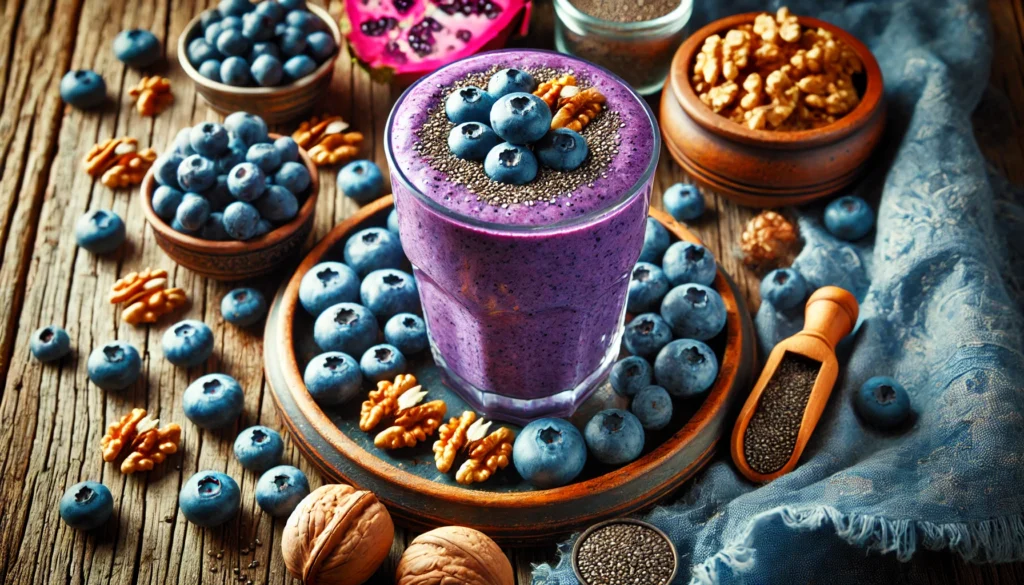Before diving into specific beverages, it’s crucial to understand the broader context of diet and its impact on brain health. The brain, like any other organ, requires proper nutrition to function optimally. Diets rich in antioxidants, anti-inflammatory compounds, and essential nutrients are believed to support cognitive health and reduce the risk of neurodegenerative diseases.
You may also like: Memory-Boosting Foods You Should Try Today
Nutritional Requirements of the Brain
The brain is an energy-intensive organ, consuming about 20% of the body’s energy. It needs a constant supply of glucose and essential fatty acids for optimal function. Omega-3 fatty acids, found in fish and nuts, are particularly vital for maintaining the structure and function of brain cells. Additionally, vitamins and minerals such as B-vitamins, vitamin D, and magnesium play crucial roles in neurotransmitter synthesis and brain signaling.
Antioxidants and Neuroprotection
Antioxidants are compounds that neutralize free radicals, which are unstable molecules that can damage cells, including neurons. Foods and beverages high in antioxidants can protect brain cells from oxidative stress, a factor implicated in dementia. Research suggests that a diet abundant in fruits, vegetables, and certain beverages can help reduce the risk of cognitive decline.
The Impact of Inflammation on Cognitive Health
Chronic inflammation is a significant contributor to neurodegenerative diseases. Anti-inflammatory compounds, found in foods like leafy greens and certain teas, can help reduce inflammation in the brain. A diet that minimizes processed foods and emphasizes natural, whole foods can be instrumental in maintaining brain health.
Green Tea: A Potent Brew
Green tea has long been celebrated for its health benefits, particularly due to its high concentration of polyphenols, which are powerful antioxidants. These compounds help combat oxidative stress, a key factor in the progression of dementia. Studies have shown that regular consumption of green tea may enhance memory and cognitive function.
Antioxidant Powerhouse
Green tea’s antioxidant properties are primarily attributed to catechins, particularly epigallocatechin gallate (EGCG). These compounds have been shown to protect neurons from damage and support brain plasticity. Regular consumption of green tea can reduce the risk of developing neurodegenerative diseases by mitigating oxidative stress and improving overall brain health.
The Magic of L-Theanine
L-theanine, an amino acid found in green tea, promotes relaxation and enhances mental clarity without causing drowsiness. It increases alpha brain wave activity, which is associated with a state of “wakeful relaxation.” Studies suggest that L-theanine can improve attention span, enhance memory, and reduce anxiety, making it beneficial for maintaining cognitive function.
Green Tea and Brain Aging
Research indicates that green tea may slow down brain aging. It supports the maintenance of the brain’s synaptic plasticity, which is crucial for learning and memory. By preserving synaptic connections, green tea can help delay cognitive decline, making it a valuable addition to a dementia-preventive diet.
Coffee: More Than a Morning Pick-Me-Up
Coffee, a staple in many daily routines, is more than just a caffeine boost. Research suggests that moderate coffee consumption is associated with a reduced risk of Alzheimer’s disease and other forms of dementia.
Caffeine and Brain Function
Caffeine is known for its ability to enhance alertness and improve cognitive performance. It works by blocking adenosine receptors in the brain, preventing drowsiness and promoting wakefulness. Additionally, caffeine increases the release of neurotransmitters like dopamine and norepinephrine, which are crucial for mood regulation and cognitive function.
Antioxidants in Coffee
Beyond caffeine, coffee is rich in antioxidants, including chlorogenic acids and quinines. These compounds have anti-inflammatory properties and may protect neurons from damage. Regular coffee consumption has been linked to a lower risk of developing dementia and other cognitive disorders due to its neuroprotective effects.

Coffee and Cognitive Longevity
Studies suggest that coffee drinkers may experience slower cognitive decline as they age. The combination of caffeine and antioxidants in coffee can enhance brain function, improve memory, and protect against age-related cognitive impairments. However, moderation is key, as excessive consumption can lead to negative health effects.
Red Wine: The Resveratrol Connection
The French Paradox
The concept of the “French Paradox” has intrigued scientists for decades. Despite a diet high in saturated fats, the French population has a relatively low incidence of heart disease, a phenomenon partially attributed to their regular consumption of red wine.
Resveratrol and Neuroprotection
Red wine contains resveratrol, a polyphenol with potential neuroprotective properties. Resveratrol is believed to activate certain genes that protect brain cells from damage and reduce inflammation, potentially slowing the progression of dementia.
Balancing Benefits and Risks
While red wine offers potential cognitive benefits, it’s important to balance these with the risks associated with alcohol consumption. Moderate intake is key, as excessive alcohol can have detrimental effects on brain health. For those who choose to consume alcohol, red wine in moderation may be a part of a brain-healthy lifestyle.
Berry Juices: Nature’s Antioxidant-Rich Elixirs
Berries, particularly blueberries, strawberries, and blackberries, are packed with antioxidants and polyphenols. These compounds are thought to improve brain health and delay cognitive aging.
Blueberry Juice and Memory
Blueberry juice, in particular, has been studied for its effects on memory and brain function. Rich in flavonoids, blueberry juice may improve communication between brain cells, enhance plasticity, and increase the brain’s ability to regenerate.
The Role of Anthocyanins
Anthocyanins, the pigments that give berries their vibrant colors, have been shown to cross the blood-brain barrier and localize in brain regions involved in learning and memory. By protecting neurons from oxidative stress and inflammation, anthocyanins support cognitive function and may reduce the risk of dementia.
Incorporating Berries into the Diet
Incorporating berry juices into a daily diet can be a delicious and effective way to boost brain health. Fresh berries, smoothies, and juices offer a concentrated source of antioxidants. Regular consumption may help preserve cognitive function and support overall brain health.
Turmeric Tea: The Golden Elixir
Curcumin’s Cognitive Benefits
Turmeric tea, derived from the spice turmeric, contains curcumin, a compound with significant anti-inflammatory and antioxidant properties. Curcumin has been studied for its potential to reduce neuroinflammation and amyloid plaque buildup, two factors associated with Alzheimer’s disease.
Enhancing Curcumin Absorption
Curcumin’s bioavailability can be enhanced by consuming it with black pepper, which contains piperine. Piperine increases curcumin absorption, maximizing its potential benefits for brain health. Combining turmeric tea with a dash of black pepper can make it a potent brain-boosting beverage.
Turmeric Tea in Daily Routine
Incorporating turmeric tea into a daily routine can be a simple yet effective way to support cognitive health. Whether enjoyed as a warm drink or added to soups and smoothies, turmeric tea offers a flavorful and healthful addition to a brain-friendly diet.

Water: The Unsung Hero
While often overlooked, water is essential for maintaining optimal brain function. Dehydration can lead to cognitive impairments, including difficulties in concentration and short-term memory.
The Importance of Hydration
Adequate hydration ensures that nutrients are efficiently transported throughout the body, including the brain. It also aids in the removal of toxins and waste products that can accumulate and contribute to cognitive decline. Consistent water intake supports overall brain function and mental clarity.
Recognizing Dehydration Symptoms
Recognizing the signs of dehydration is crucial for maintaining brain health. Symptoms such as headaches, fatigue, and difficulty concentrating can indicate a need for increased water intake. Staying hydrated is a simple yet effective strategy to support cognitive health and prevent cognitive decline.
Water and Brain Health
Water plays a critical role in maintaining the brain’s structural integrity. It cushions the brain, supports neurotransmitter function, and aids in the electrical activity that powers thought processes. Ensuring adequate hydration is fundamental to preserving cognitive function and preventing dementia.
Future Directions and Considerations
While these beverages hold promise in the realm of cognitive health, it is essential to approach them as part of a broader lifestyle strategy to combat dementia. This includes a balanced diet, regular physical activity, mental stimulation, and social engagement.
Integrating Beverages into Daily Life
Incorporating these drinks into a daily routine can be both enjoyable and beneficial. However, moderation is key, particularly concerning beverages like coffee and red wine, which can have adverse effects if consumed excessively. Finding a balance that includes a variety of brain-healthy drinks can enhance overall well-being.
Personalized Nutrition
It’s important to recognize that individual responses to dietary interventions can vary. Therefore, personalized nutrition, guided by healthcare professionals, may offer the best approach to optimizing brain health and preventing dementia. Tailoring dietary choices to individual needs and preferences can maximize cognitive benefits.
The Role of Ongoing Research
Ongoing research continues to explore the complex relationships between diet and brain health. As new findings emerge, they can inform dietary guidelines and enhance our understanding of how to prevent dementia. Staying informed about the latest research can empower individuals to make informed choices for their cognitive well-being.

Conclusion
As research continues to uncover the intricate relationships between diet and brain health, beverages like green tea, coffee, red wine, berry juices, turmeric tea, and water emerge as potential allies in the fight against dementia. While no single drink can prevent or cure dementia, integrating these beverages into a comprehensive lifestyle plan may offer significant benefits for maintaining cognitive function and enhancing overall well-being.
By staying informed and making mindful choices, individuals can take proactive steps towards safeguarding their brain health and potentially delaying the onset of dementia. With ongoing research and a commitment to a healthy lifestyle, the future looks promising in the quest to combat this challenging condition.
Further Reading:
Relationship of Wine Consumption with Alzheimer’s Disease
Brain Foods That May Help Prevent Dementia
Caffeine as a protective factor in dementia and Alzheimer’s disease
Important Note: The information contained in this article is for general informational purposes only, and should not be construed as health or medical advice, nor is it intended to diagnose, prevent, treat, or cure any disease or health condition. Before embarking on any diet, fitness regimen, or program of nutritional supplementation, it is advisable to consult your healthcare professional in order to determine its safety and probable efficacy in terms of your individual state of health.
Regarding Nutritional Supplements Or Other Non-Prescription Health Products: If any nutritional supplements or other non-prescription health products are mentioned in the foregoing article, any claims or statements made about them have not been evaluated by the U.S. Food and Drug Administration, and such nutritional supplements or other health products are not intended to diagnose, treat, cure, or prevent any disease.


